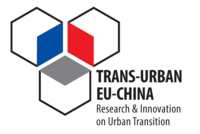
TRANS-URBAN-EU-CHINA
Transition towards urban sustainability through socially integrative cities in the EU and in China
About project
One of the greatest challenges facing Chinese urbanisation is how to best design and turn cities into intelligent, socially integrative and sustainable environments. TRANS-URBAN-EU-CHINA addresses this key challenge. According to the 13th Five-Year Plan (2016-20120), China will “redouble” its “efforts to improve urban planning, development, and management” and to “improve living environments so that people can enjoy a more secure, relaxing, and satisfying city life”. The (Chinese) National New Urbanisation Plan (2014-2020) provides strong policy support for strategic decision-making and implementation of sustainable development approaches, aiming to be innovative, coordinated, green, open and shared. Good practices and methods from Europe in terms of social inclusiveness, cultural dynamics and economic viability have proven to be very significant to China, but Chinese cities need new insights to implement, scale up and transfer these practices in their own operational realities. This can also produce positive learning effects on the European side, and will influence the European research agenda on sustainable urbanisation.
On this background, the key objective of TRANS-URBAN-EU-CHINA is to help policy makers, urban authorities, real estate developers, public service providers and citizens in China to create socially integrative cities in an environmentally friendly and financially viable way. Moreover, it helps urban stakeholders in Europe to reflect and eventually reconsider their approaches towards sustainable urbanisation. In order to achieve the main objective, the project
- Develops a systematic knowledge base on transition experiences in Europe and China in a comparative way, and makes key results publicly available as a book addressing practitioners, the scientific community and students;
- Advances tools and measures to support transition in cooperation with local stakeholders and citizens, and tests them in two Living Labs located in Chinese cities with the purpose to derive operational and evidence-based knowledge about urban transformative capacity;
- Elaborates related recommendations to support transition towards socially integrative cities, discusses them with representatives of 60 Reference Cities and a wider stakeholder community, and disseminates them through a variety of channels, including a web-based compendium of tested tools and measures adapted to local socio-economic, cultural and political specificities; the compendium includes policy briefs, guidelines, methods, and good practice examples for the development of socially integrative cities and for strengthening transformative capacities of local stakeholders.